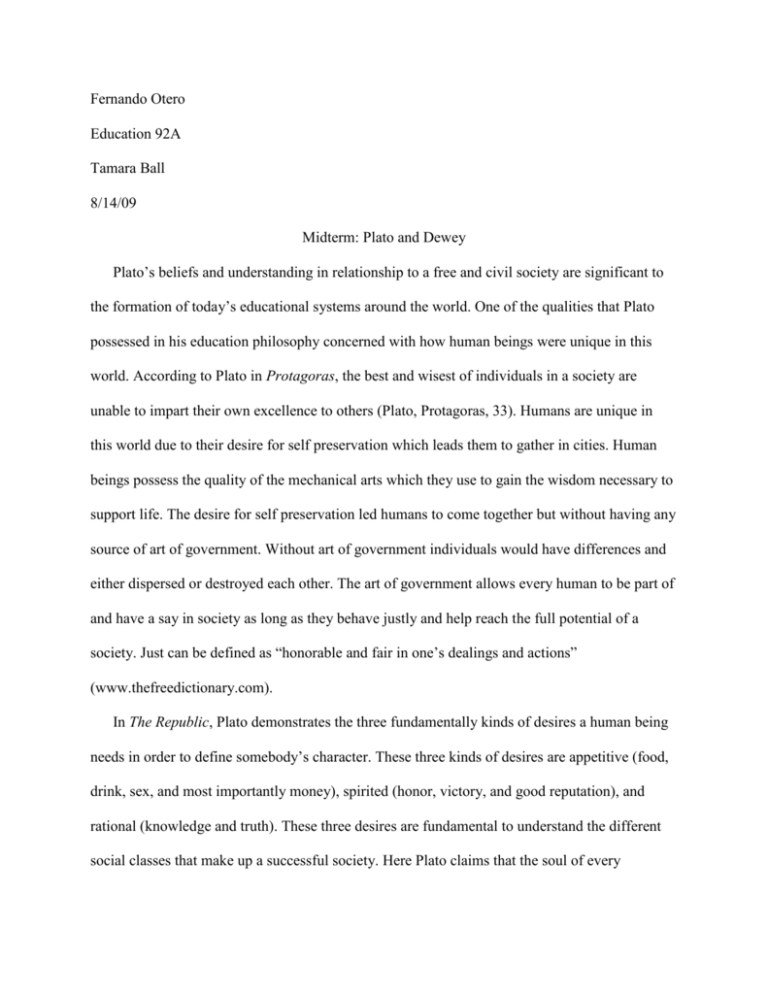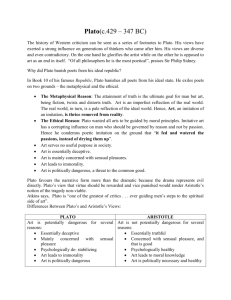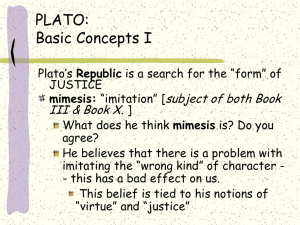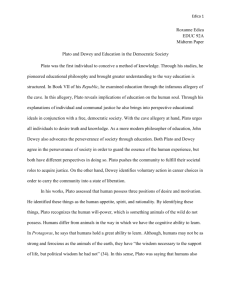EDU 92A Midterm
advertisement

Fernando Otero Education 92A Tamara Ball 8/14/09 Midterm: Plato and Dewey Plato’s beliefs and understanding in relationship to a free and civil society are significant to the formation of today’s educational systems around the world. One of the qualities that Plato possessed in his education philosophy concerned with how human beings were unique in this world. According to Plato in Protagoras, the best and wisest of individuals in a society are unable to impart their own excellence to others (Plato, Protagoras, 33). Humans are unique in this world due to their desire for self preservation which leads them to gather in cities. Human beings possess the quality of the mechanical arts which they use to gain the wisdom necessary to support life. The desire for self preservation led humans to come together but without having any source of art of government. Without art of government individuals would have differences and either dispersed or destroyed each other. The art of government allows every human to be part of and have a say in society as long as they behave justly and help reach the full potential of a society. Just can be defined as “honorable and fair in one’s dealings and actions” (www.thefreedictionary.com). In The Republic, Plato demonstrates the three fundamentally kinds of desires a human being needs in order to define somebody’s character. These three kinds of desires are appetitive (food, drink, sex, and most importantly money), spirited (honor, victory, and good reputation), and rational (knowledge and truth). These three desires are fundamental to understand the different social classes that make up a successful society. Here Plato claims that the soul of every individual has use of these desires and that you are more entitled to a specific desire depending on what type of social class you belong to. For example, in Plato’s ideal society there are three types of individuals, the producers that are the craftsmen, carpenter, farmer, etc, which are entitled to an appetitive desire; auxiliaries which are the warriors and are entitled to the spirited desire; and guardians which are the rulers that posses the rational desire (Plato, Republic, xv). Each group must perform their own function in society for it to be able to function properly and have its full potential. Each individual learns its skill or job in society due to its nature by which he is presumed to already be in. Plato believes that the “fundamental goal of education is not to put knowledge into people’s souls but to change their desires, there by turning them around from the pursuit off what falsely believe to be happiness to the pursuit of true happiness” (Plato, Republic, xvi). The aim of education is not to put knowledge into the soul, but change what desires go into the soul. Because philosophers are highest in class in Plato’s society they are the ones who posses knowledge and are more than just humans. Their souls, more then others, intend to complete the desires of the rational part. True knowledge is a form of knowledge that is only set apart for those who have aspired to rational desires. According to Plato, “only really virtuous people can actually gain genuine ‘true’ knowledge of ethical truth” (Plato, Protagoras, 36). Plato believed that the rulers of society obtain this true knowledge and understanding of what is ‘good’ by nature. The intent of education in this society is aimed towards these rulers, who have naturally gained this virtue or knowledge, is to teach children to become future rulers and thus spread virtue throughout society. The allegory of the cave that Plato uses in The Republic exemplifies the effect that education has on us and how it helps us develop true knowledge or virtue. The prisoners are bound to only see the shadows projected on the walls of the cave. According to Plato, the shadows are as close as the prisoners get to seeing reality. He then explains how the philosopher is like a prisoner who is freed from the cave and comes to understand that the shadows on the wall are not constitutive of reality at all, as he can perceive the true form of reality rather than the mere shadows seen by the prisoners. The allegory of the cave hence has an epistemological approach towards the education that children should obtain to be able to access the correct knowledge to reach virtue or be a just citizen. Plato states that children must be watched “from earliest childhood and set them tasks; if we find one bearing himself well in all these trials and resisting every enchantment, a true guardian of himself, preserving always that perfect rhythm and harmony of being” (Plato, Protagoras, 37). This is the process in which virtue is taught on the children for the good of society. Through the process of education teachers “find one who has come unscathed through every test in childhood, youth, and manhood, we shall set him as a Ruler” (Plato, Protagoras, 37). To know what type of knowledge is trustworthy of pursuing depends on what type of person you are, what your role in Plato’s society is. Because “‘money-lover’ takes the good or happiness to consist in reliably satisfying his appetitive desires, an honor-lover, his spirited desires; a philosopher, his rational desires all three types of citizens have different conceptions of what good or happiness consists in and what we think the good depends on what they want.” According to Plato, to escape living in a society ruled by false ideology society must be ruled by “rulers whose knowledge of mathematized ethics, politics, psychology, and the rest given them access to undistorted ethical truth” (Plato). To give full ruling power to these elites might disrupt happiness to others and be unjust. Because the rulers whose knowledge is enough to rule might want to “feather their own nest” and only fulfill desires that transcends to gaining virtue and good itself. John Dewey was an education philosopher whose thoughts and ideas were greatly significant in building the educational system that we have today in the United States and around the world. In comparison with Plato’s analysis of the separation of classes, Dewey had the same conception about why certain individuals were born into duties based on the division of classes. Dewey explains that “the separation of liberal education from professional and industrial education goes back to the time of the Greeks [Plato], and was formulated expressly on the basis of a division of classes into those who had labor for a living and those who were relieved of this necessity” (Dewey, 52). The concept of liberal education favored the higher class and the working class to perform duties in society that were necessary for everybody to live at peace. The work that the working class performed “enabled the superior class to live without personal engaging in occupations taking almost all the time and not of a nature to engage or reward intelligence” (Dewey, 52). There exists a blockage for the kind of education that has been established because of socially dividing classes. Dewey acknowledges because barriers exist within society that only allows the education system to be efficient and trained for a useful manner in society. Unlike Plato, Dewey disagrees with the philosophy of education in order to stabilize society to keep a few and “train them to be efficient in them and yet to keep them in their place” (Dewey, 53). According to Dewey, human function is distinctively unique due to the reason existing for the sake of beholding the spectacle of the universe (Dewey, 52). Since intelligence is inconstant in humans, like animals and physical tools, they are by nature and not social convention tied to their social class. Like Plato, Dewey exhibited the idea that to be able to live in a just/worthily society there need it to be a sense collectivity within citizens even though there was differences within the division of classes. Dewey, as well as Plato, talks about how to gain full access to knowledge. In knowing, in the life of theory, reason finds its own full manifestation (Dewey, 55). Knowledge is acquired by someone’s own will to develop virtue and see it as something that would benefit the individual first and then society. Unlike Plato, Dewey believes that changes in society must be made in order to reach its highest potential. For Dewey, in order to have a truly democratic society there needs to be a “share in useful service and all enjoy a worthy leisure” (Dewey, 56). For this truly democratic society that Dewey suggests there to be an educational reorganization that would explicitly affect social life. For this educational reorganization Dewey suggests that liberal education cannot have anything to do with industrial affairs since it will disrupt the aim of education which is the nurture and appreciation of thought. My hometown, Salinas, Ca, is mostly known for gang violence and its agriculture. The town’s nickname is “Saladbowl” due to its high amount of production in lettuce. I was born in Mexico and at eight years of age migrated to the United States. The schools I attended to in Salinas were from the east side of town which was where most of the violence happened. My experience through education in high school opened up my questioning of who society wanted to succeed. In my senior year of high school I sign up for AP classes to be able to obtain a higher GPA and have a taste of how college courses would be. At the end of the school year when we took the AP exams is when I notice kind of discrimination and difference in the division of social classes. Since my high school was in the “wrong” side of town they made us take the exams at a local church. Other schools that were predominantly attended by Anglo youth got to take their exams in their schools. In other cases I felt that the school district didn’t do enough to decrease our dropout rate and increase our graduation rate. Since there is this notion that Latinos have taken over working in fast food restaurants students strive to only due enough to gain a high school diploma and work a minimum pay job. In my school most of the teachers priorities is to graduate the students in other schools the priority is to get a student into college. There seems to be this label that minorities or migrants come here to serve others. This applies to Plato’s philosophy in which some are naturally born into mechanical duties in society and others to rule and be served. Works Cited 1. C.D.C. Reeve. (1992). The Main Argument of The Republic. In Plato/Republic. Indianapolis, IN: Hackett Publishing Company. xiv-xvii. 2. John Dewey (1916). Democracy and Education in Labor and Leisure 3. Plato (BCE) Protogoras Classical Theories B. Jowett (Trans)








